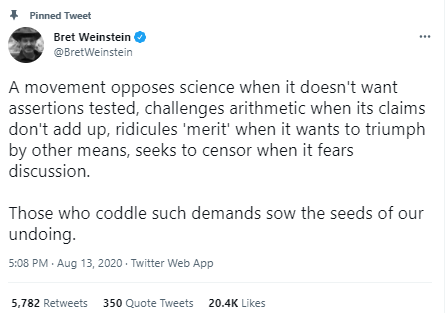There’s a big argument raging about what to call this thing. I refer to it as Critical Race Theory because these teachings have their roots in CRT, even though these teaching have morphed into what we are currently seeing in many classroom. Whatever you call it, you can find it in all these places.
Are there other things to be wary of? Absolutely. Climate issues, current and future pandemics, the false narratives of the far right. Many of these discussions are unproductive for the same reason that we can’t discuss CRT: because we can’t even agree on the basic facts. I’m not in the mood for what-about-ism at the moment, because unapologetic woke struggle sessions now inhabit many of our once-schools and universities. Why do I keep “obsessing” about this trend? Because unquestionable facts (e.g., the biological fact that there are two–and only two-sexes) mean nothing to many of those who lead these sessions. They proclaim that striving for excellent and reaping the rewards of hard work is inappropriate.
On racial issues, the leaders of these sessions are smearing the legacy of Martin Luther King, Jr. When I read their words, I imagine these loud and rude Wokesters throwing rotten fruit or rocks at MLK and jeering him. They claim to be leading a new improved Civil Rights Movement, but they are reversing the gains of the past 60 years. They call it progress when they go into third grade classrooms, dividing the children by color and sow lifetime seeds of suspicion and distrust when they tell the “white” children that they are oppressors of the “black” children. These kids should be freely playing with each other at recess, but now they are being told to fear each other. Further, the “black” children are being fed huge doses of the soft bigotry of low expectations.
Yet social media bristles with accusations that to have these concerns makes one a “conservative” or a “Republican” and that people like me are paranoid because the new syllabus merely teaches “racial history,” as though previous generations of children have not been taught about racial history.
Hell, yes, I’m concerned. And I will keep speaking out as long as larges swathes of social media are motivated to get the facts wrong. I feel the moral imperative to be, if necessary, the only one in the large room to speak up.



CRT is a scam and its most ardent supporters not only know that, they quietly laugh at the rest of us who grovel or protest, with the protesters being identified for cancellation.
It seems to me that it might be worthwhile to keep in mind that they (at least what I’ve read so far) don’t push Critical Theory as such. They use CRT as a tool to arrive at some silly conclusion and then push that idea for all they’re worth.
The best characterization of this general trend that I’ve encountered came from watching an Ayaan Hirsi Ali YouTube thingie (I don’t remember which one) where someone in the audience asked a wokish question and she responded that the questioner was, in effect, advocating an abandonment of the Enlightenment in favor of an atavistic retreat to tribalism and all that that entails. I’m not sure how to capitalize on this insight. Maybe back off on showing how silly their mumbo jumbo is and ask instead if people would rather be considered innocent until proven guilty before a jury, or innocent until accused by some self-appointed witchsmeller pursuivant.
I agree that it is not classic Critical Race Theory that is being peddled in many classrooms. However, classic CRT underlies many of the ideas taught in many of our schools. See this recent passage from the Wall Street Journal:
Further, some of the so-called antiracists do give specific homage to Critical Race Theory. There is a lot of overlap between classical CRT and what is being taught in many classrooms. Of course, we don’t actually know is being taught in most classrooms, but we do know what is being taught in some classrooms. We don’t have a name for all of these variants. Classic CRT is the basis for the core ideas of many of these variants. Whatever a person wants to call it, I detest it. It denies any progress since the 1960s and it attacks MLKs urge to judge each other based only on content of character. Whatever we eventually decide to call the many types of thing in many classrooms, there is most definitely a trend. Someday we might have a better name for it. How about “Neo-CRT”?